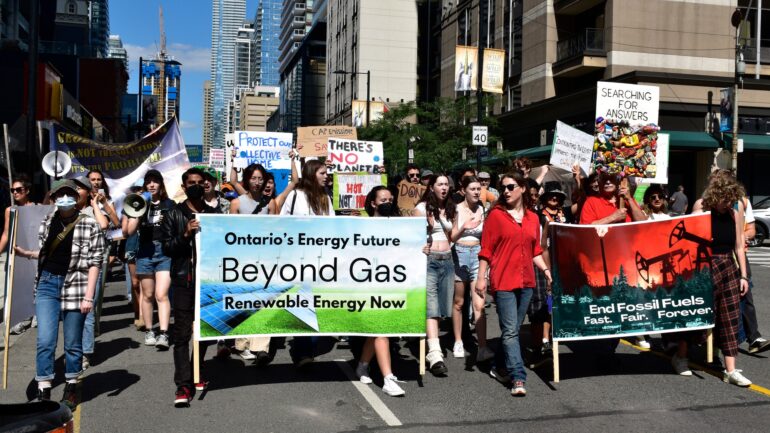Medical student Grace Kuang believes climate change is the most significant public health issue of the era and says action is needed to end the use of fossil fuels.
The University of Toronto student was among thousands who took to the streets at Queen’s Park on Saturday demanding leaders take action against climate change.
“I want people to know that climate change is the biggest public health issue of our time,” Kuang said. “I think climate justice is the most effective preventative health measure because you’re preventing all of the things from happening downstream.”
The event was one of more than 400 demonstrations of the Global Fight To End Fossil Fuels, which wants the end of fossil fuels to be fast, fair and forever. It was part of a worldwide mobilization last week leading to the United Nations Climate Ambition Summit 2023.
The demonstration saw a coalition of different climate justice organizations and local groups marching together, including Fridays For Future Toronto, Seniors for Climate Actions Now!, For Our Kids Toronto, ClimateFast, Toronto 350.org, health care workers, labour federations, and students.
“Fossil fuels are literally killing us,” said Dr. Mili Roy, regional co-chair of the Canadian Association of Physicians for the Environment (CAPE) in an email statement to Humber’s Et Cetera.
“They escalate the climate crisis, now recognized as the single greatest human health crisis of our time, and also create lethal air pollution which kills over 15,000 Canadians prematurely every year,” Roy said. “The only livable way forward to the sustainable thriving future we can still achieve must be fuel-free.”
Environmental liabilities and pay reparations were among the main demands from the demonstrators. The rally’s website wants the oil and gas industries to be held responsible for damages to local communities and repay the cost of disrupting the environment.
“We have to make sure that we’re making the polluters pay and that we’re not making working people face the brunt of the transition, which is what’s going to happen if we don’t act on it,” said Amy Mann, co-coordinator for Climate Justice U of T.
Mann cited the tailing ponds in Alberta as an example of how inaction and the economic cost of large fossil fuel companies affect the population, especially Indigenous communities.
“We’re going to be left to clean this up,” Mann said. “Fair means that we have to be proactive and we have to make sure that we’re making the polluters pay to clean up the mess that they made.”
The Ontario Provincial Climate Change Impact Assessment assesses the risks posed by climate change in the province by the 2080s. It said the number of extreme heat days, with temperatures over 30 C, will range between 55 to 60, four times the current average of 16 days.
The findings from the January 2023 assessment are drawn from five main categories: food and agriculture, infrastructure, business and economy, natural and environment, and people and communities.

Demonstrators march in downtown Toronto for the Global March to End Fossil Fuels on Saturday, Sept. 16. Photo credit: Luca Furlano
Zoe Keary-Matzner, one of the organizers for Friday For Future Toronto, said new generations are witnessing the impacts of climate change firsthand. It is important to take action to stop governments subsidizing the fossil fuel industry, she said.
Keary-Matzner said she is part of an ongoing lawsuit against the Ford government for lowering the province’s climate targets.
“We said that was unconstitutional against our Charter rights, our right to life and the security of the person, and also discrimination towards youth and Indigenous youth,” she said.
“What we can do is actually work together because we know climate change is a systemic problem caused by our addiction to fossil fuels,” Keary-Matzner said. “So really what young people can do is get organized, join a group and raise awareness.”
Toronto Public Health reports air pollution is the leading cause of 1,300 premature deaths and 3,550 hospitalizations annually. This summer, Environment Canada released numerous Special Air Quality Statements for Toronto due to the deteriorating air quality related to forest fires. The global air quality tracker IQAir reported Toronto was the worst city for air quality among major cities on June 28.
University of Toronto medical students Kuang and Machal Leckie say climate change is a significant public health issue.
“If you go all the way back, the root of the problem is fossil fuels,” Kuang said.
Kuang said stopping pollution at the root is preventative health, “and that is public health.”
Leckie said it is important to understand that climate change is interconnected with other justice and social issues.
“Climate justice isn’t just limited to green initiatives like recycling, but also related to affordable housing, anti-racism, and democracy,” she said. “All of these things affect health.”
NDP Leader Jagmeet Singh and Ontario Green Party Leader Mike Schreiner joined the demonstrators. Days after the demonstration, Ford made a surprise announcement on Sept. 21 saying he was rescinding all plans to swap Greenbelt lands.
Schreiner said it is crucial to protect the Greenbelt to be better prepared for the climate crisis.
“The forests and wetlands of the Greenbelt are vital to protecting us from extreme weather events, especially flooding,” he said. “So I think that’s why you see all these signs here today saying Doug Ford, keep your hands off the Greenbelt.”
He said building multiplexes, four-storey walk-up apartments and six to 11-storey apartment buildings along major transportation routes would help people afford homes. That could be done on land already approved for development, Schreiner said.
“Those are areas that have sewer, water and hydro lines and roads,” he said. “That’s the way that we can meet our housing goals while protecting the Greenbelt.”
Singh said he supports demonstrators in their demand for action.
“We’re living through the climate crisis right now,” he said. “We need to end fossil fuel subsidies, put a cap on emissions, and invest in clean energy and in an economy that works for workers and for the planet.”

